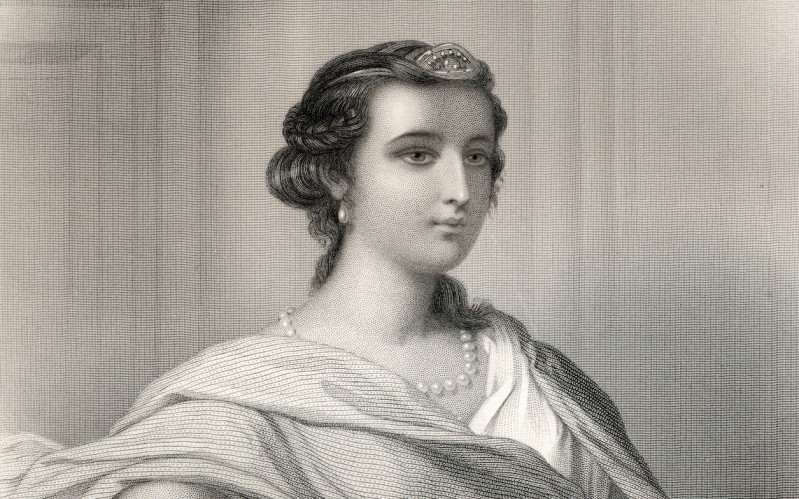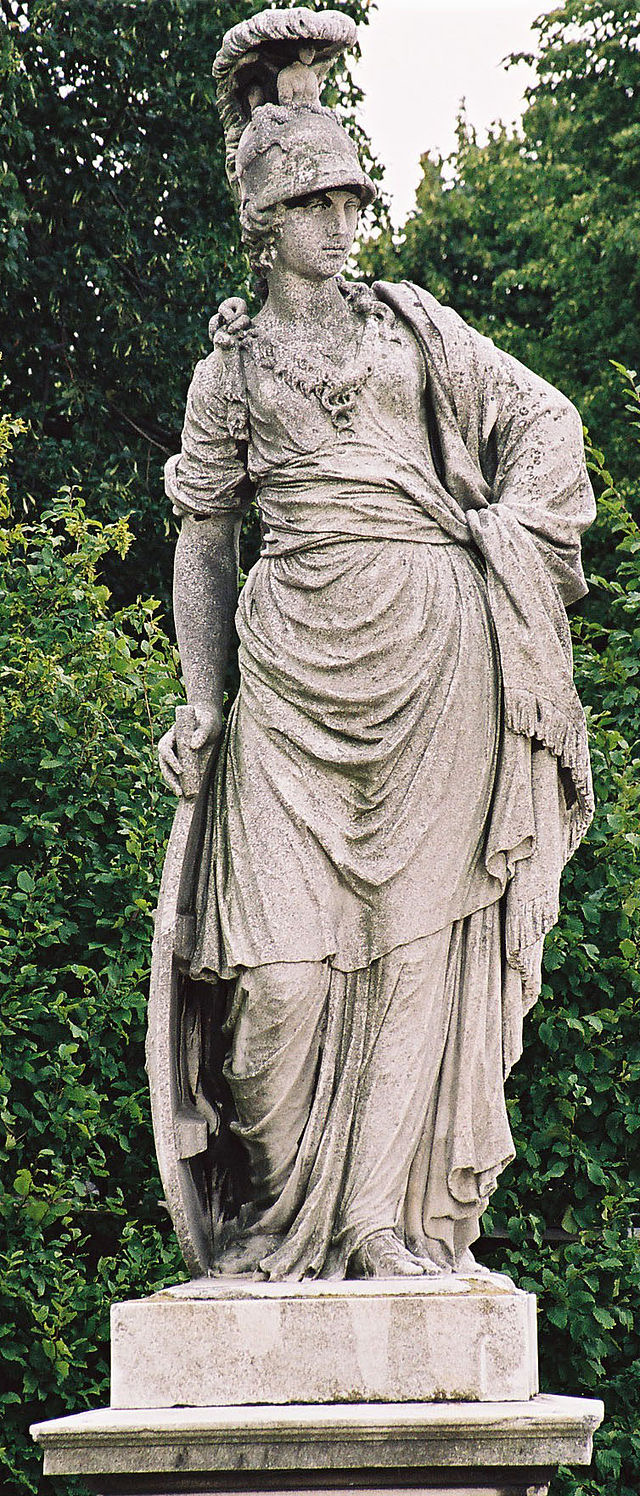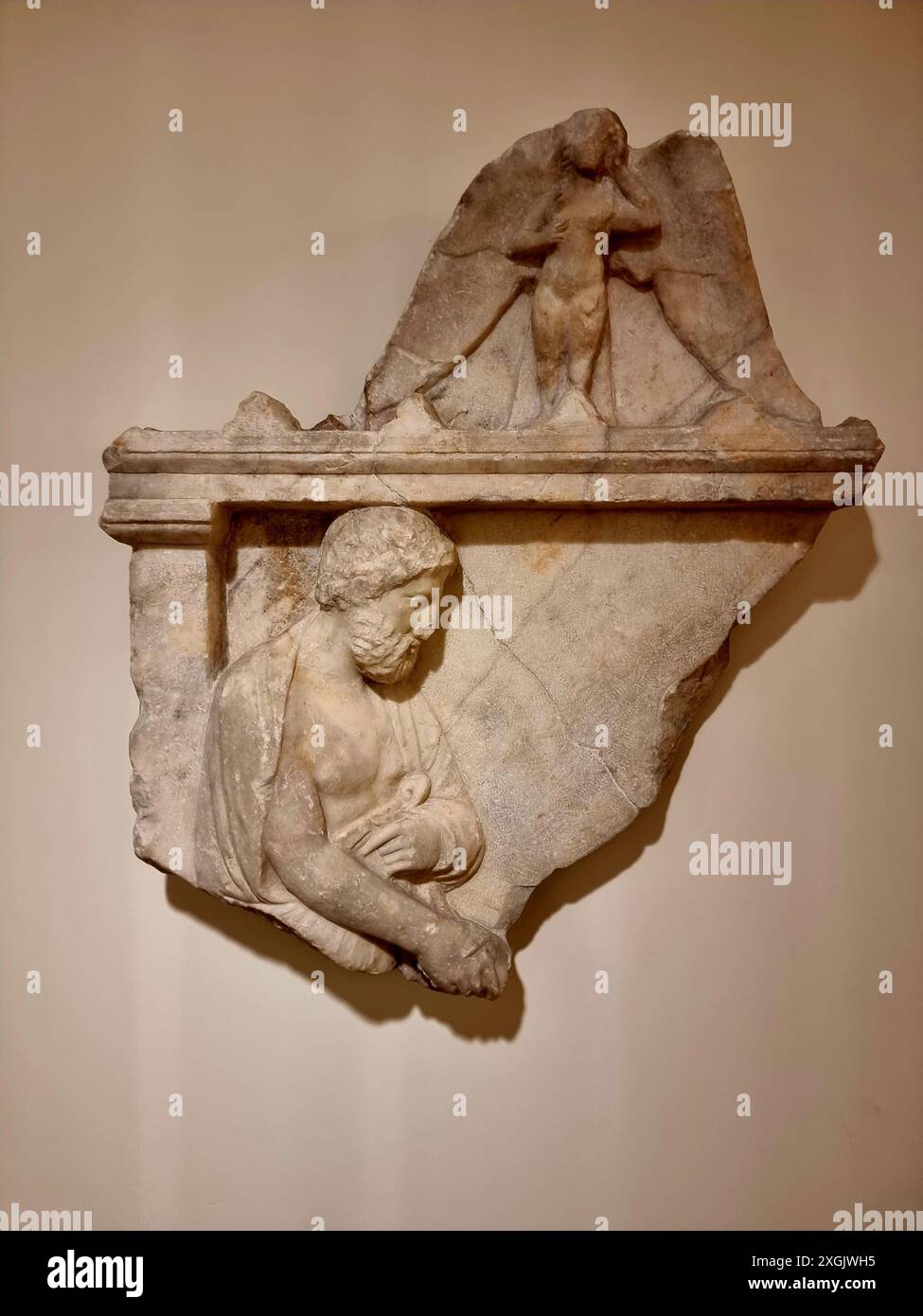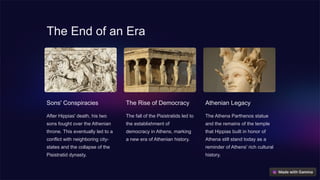Aspasia of Miletus: The Influential Woman Behind Ancient Athens
Introduction: A Woman of Mystery and Power
Aspasia of Miletus stands as one of the most intriguing and controversial figures of classical Athens. Unlike most women of her time, she wielded significant intellectual and political influence in a society that often relegated women to the domestic sphere. As the companion of Pericles, Athens's greatest statesman, and a central figure in its golden age, Aspasia defied conventions and left an indelible mark on philosophy, rhetoric, and Athenian culture. Yet, despite her prominence, much of her life remains shrouded in mystery, with historians debating the extent of her achievements and influence.
Early Life and Background
Born in Miletus, a thriving Greek city in Ionia (modern-day Turkey), around 470 BCE, Aspasia came from a wealthy and educated family. Unlike Athenian women, who were often confined to their homes, Ionian women like Aspasia enjoyed more social and intellectual freedom. This upbringing likely shaped her extraordinary confidence and eloquence, traits that would later captivate Athens's elite.
Little is known about her early years, but by her twenties, Aspasia had moved to Athens. There, she entered the world of the city's intellectual and political circles, an unusual feat for a foreign-born woman in a male-dominated society.
Aspasia and Pericles: A Powerful Partnership
Aspasia's life changed dramatically when she became the companion of Pericles, Athens's leading statesman. Though they could not marry legally (Athenian law prohibited unions between citizens and foreigners), their relationship was widely acknowledged. Pericles, known for his formidable political acumen, was deeply influenced by Aspasia, valuing her intellect and counsel.
Ancient sources, including Plutarch, suggest that Aspasia played a key role in shaping Pericles's speeches and policies, even influencing his stance during the Peloponnesian War. Her home became a gathering place for philosophers, artists, and politicians, including Socrates, who reportedly admired her rhetorical skill.
Despite their affection, their relationship was not without scandal. Athenian conservatives viewed Aspasia with suspicion, accusing her of corrupting Athenian women and meddling in politics. She was even put on trial for impiety, though Pericles's intervention secured her acquittal.
Aspasia’s Intellectual Influence
Beyond her association with Pericles, Aspasia was renowned as a philosopher and teacher of rhetoric. Some ancient writers, including Plato and Xenophon, hint that she ran an academy for elite women, instructing them in philosophy and public speaking—an astonishing claim given the restrictions on women's education in Athens.
Her rhetorical prowess earned her comparisons to the greatest orators of the time. Socrates, in Plato's *Menexenus*, jokingly credits her with authoring Pericles's famous Funeral Oration, one of the most celebrated speeches in Athenian history. Whether true or not, the anecdote reflects her reputation as a formidable intellectual.
Aspasia in Ancient Literature and Modern Perception
Aspasia appears in numerous classical texts, though often through the lens of Athenian biases. Comic playwrights like Aristophanes caricatured her as a seductress, while later philosophers debated her role in shaping Athenian politics. Modern scholars, however, have reassessed her influence, recognizing her as a rare female voice in antiquity who navigated—and subtly transformed—the rigid hierarchies of her time.
Her legacy endures not only in historical accounts but in feminist reinterpretations that celebrate her defiance of gender norms. Aspasia remains a symbol of intelligence, resilience, and the unyielding pursuit of knowledge in the face of societal constraints.
Conclusion: The Enduring Enigma of Aspasia
Part of what makes Aspasia so compelling is the ambiguity surrounding her life. Was she merely a clever companion, or did she shape the course of Athenian democracy? The truth likely lies somewhere in between, but her story challenges our understanding of women's roles in antiquity.
As we delve deeper into Aspasia's world in the following sections, we will explore her philosophical contributions, her influence on Athenian society, and the myths that continue to surround her name. Few women of ancient Greece have left such a lasting—and controversial—legacy.
Stay tuned for Part Two, where we examine Aspasia's role in Athenian politics and her enduring impact on philosophy and rhetoric.
Aspasia’s Role in Athenian Politics and Society
Though women in classical Athens were typically excluded from public life, Aspasia was an exception. Her relationship with Pericles granted her unprecedented access to the political sphere, and she is often portrayed as an influential advisor behind some of Athens’s most critical decisions. Unlike traditional Athenian wives, who were expected to remain unseen and unheard, Aspasia engaged in intellectual and political discourse, earning both admiration and contempt from contemporaries.
Some historians argue that her influence extended to foreign policy, particularly during the First Peloponnesian War. Plutarch suggests that Pericles sought her counsel on important matters, including the Samian War (440 BCE), where Athens clashed with the island of Samos. Others speculate that her Metic (foreign resident) background provided Pericles with valuable diplomatic insights. While direct evidence is limited, her presence in key discussions implies a level of political involvement unusual for any woman of her time.
The Trial of Aspasia: Scandal and Survival
One of the most dramatic episodes in Aspasia’s life was her trial on charges of impiety and corrupting Athenian women. The accusations, likely politically motivated, stemmed from her unorthodox lifestyle and her perceived influence over Pericles. Ancient sources, including Plutarch and Athenaeus, claim that her teachings led respectable Athenian women astray, undermining traditional values.
The trial became a spectacle, with prosecutors attacking her character and her foreign origins. Pericles, in a rare emotional display, reportedly pleaded for her acquittal, even shedding tears in court—an act that allegedly persuaded the jury to spare her. Though she was cleared of charges, the incident reveals the tensions surrounding her presence in Athenian society. Her survival highlights both her resilience and the precarious position of intelligent women in a deeply conservative culture.
Salon of Aspasia: A Hub of Athenian Intellectuals
Beyond politics, Aspasia’s home became a renowned intellectual gathering place. Unlike the male-dominated symposia of Athens, her salons welcomed both men and women, fostering discussions on philosophy, literature, and governance. Among her frequent guests was Socrates, who, according to Plato, regarded her as a skilled rhetorician. Other notable figures, such as the playwright Euripides and the sculptor Phidias, sought her company, suggesting that she was at the heart of Athens’s cultural flourishing.
Some scholars argue that Aspasia’s salon functioned as an informal academy, where she debated ethics, metaphysics, and rhetoric. Her emphasis on persuasive speech and logical argumentation may have influenced Socratic thought, though definitive proof remains elusive. Nevertheless, her ability to command respect in such circles underscores her intellectual prowess.
Aspasia’s Influence on Rhetoric and Philosophy
Ancient writers frequently credit Aspasia with shaping the rhetorical techniques of Athens’s greatest orators. In Plato’s *Menexenus*, Socrates claims that Aspasia composed Pericles’ Funeral Oration, a masterpiece of classical rhetoric. While this is likely a philosophical jest, it acknowledges her reputed skill in speechcraft. Similarly, Cicero and Quintilian later reference her as a model of eloquence.
Her philosophical contributions are harder to pinpoint, but hints in Socratic dialogues suggest she engaged with ideas on love, virtue, and governance. Some modern scholars propose that her teachings on relationships and morality may have influenced Plato’s concept of the philosopher-king. Whether directly or indirectly, Aspasia’s ideas permeated Athenian thought, challenging conventional gender roles.
Motherhood and Later Life
Aspasia had a son, Pericles the Younger, whose citizenship was secured through a special decree since his parents could not legally wed. Raised in Athens’s elite circles, the young Pericles later became a military leader, though his career was marred by controversy. Aspasia’s role as a mother adds another layer to her complex identity, showcasing her navigation of both private and public spheres.
After Pericles’ death in 429 BCE, Aspasia reportedly formed a relationship with another Athenian statesman, Lysicles. Though details are sparse, her continued association with prominent figures indicates her enduring influence. The date and circumstances of her death remain unknown, but her legacy persisted through the writings of philosophers and historians.
Debates Among Modern Historians
Modern scholars remain divided on Aspasia’s historical significance. Some argue that her impact has been exaggerated, shaped by the biases of ancient authors who either idolized or vilified her. Others assert that she was a genuine intellectual force whose contributions were downplayed due to her gender.
Feminist historians, in particular, highlight her as a proto-feminist figure who defied Athens’s patriarchal norms. By engaging with philosophy, politics, and rhetoric, she challenged the notion that women were unfit for public discourse. Yet, the lack of surviving writings from her own hand makes it difficult to separate myth from reality.
Conclusion: A Woman Ahead of Her Time
Aspasia’s story is one of brilliance, resilience, and contradiction. She thrived in a society that sought to silence women, shaping Athenian politics and philosophy despite relentless scrutiny. Whether as Pericles’ confidante, a philosophical teacher, or a target of political attacks, she left an indelible mark on history.
In the next and final section, we will explore Aspasia’s enduring cultural legacy, examining how her image has evolved from antiquity to modern times and what she symbolizes for contemporary discussions on gender and power. Stay tuned for the conclusion of this fascinating journey into the life of one of antiquity’s most extraordinary women.
Cultural Representations of Aspasia: From Antiquity to Modernity
The figure of Aspasia has fascinated writers, artists, and scholars for nearly 2,500 years. In classical times, playwrights like Aristophanes mocked her as a scheming courtesan in comedies such as Acharnians, reflecting Athenian discomfort with her influence. By contrast, later Greek and Roman writers often portrayed her more sympathetically as an intellectual luminary. Plutarch, writing centuries later in his Lives, acknowledges her political savvy, while Cicero praised her rhetorical skills in De Inventione.
During the Renaissance, Aspasia experienced a revival as humanists rediscovered classical texts. Pierre Corneille's 17th-century tragedy "Aspasie" depicted her as a virtuous, intelligent woman trapped by circumstance - a marked departure from ancient Athenian portrayals. Romantic era artists like Joséphine Bowes painted her as an elegant Salonnière, highlighting her role as a cultural patron. These shifting representations reveal how different eras projected their own values onto this enigmatic figure.
A Feminist Reclamation in the Modern Era
The 20th century witnessed a dramatic reassessment of Aspasia's legacy. Feminist scholars pointed to her as evidence that women participated in classical intellectual life despite systemic exclusion. Margaret Fuller's 19th-century writings cited Aspasia as proof of women's philosophical potential, while 20th-century historians like Madeleine Henry worked to disentangle historical fact from misogynistic slander.
Contemporary scholarship emphasizes Aspasia's agency, noting how she skillfully navigated Athens's restrictive environment. Some theorists suggest she pioneered what we might now call feminist rhetoric - developing persuasive techniques appropriate for someone excluded from formal political participation. Others highlight how her teachings created space for women's voices in philosophical discourse, however limited by the standards of her time.
Literary Resurrections and Popular Culture
Modern fiction has enthusiastically embraced Aspasia as a character. Taylor Caldwell's 1965 novel Glory and the Lightning offered a sympathetic fictional biography. More recently, she appears as a key character in numerous historical novels set in ancient Athens, often portrayed as an early feminist icon. Television documentaries and podcasts about the ancient world increasingly include segments discussing her influence.
In academia, Aspasia has become a case study for examining both gender dynamics in classical Athens and the methodological challenges of studying women in antiquity. The University of Houston even named a prestigious female faculty award after her, explicitly honoring her legacy as an educator and intellectual leader.
The Philosophical Legacy: Beyond Gender
Beyond feminist interpretations, Aspasia's intellectual contributions deserve independent consideration. Some scholars argue that elements of Socratic irony and dialectic may reflect her rhetorical techniques. The few surviving descriptions of her teaching methods emphasize practical applications of philosophy, suggesting she may have influenced what became the Peripatetic tradition.
Her suspected involvement in composing Pericles' speeches suggests sophisticated understanding of civic ideology. Historians note parallels between Pericles' Funeral Oration and later democratic philosophies, raising provocative questions about Aspasia's possible role in shaping foundational Western political thought. While evidence remains circumstantial, the possibility challenges traditional narratives about the exclusively male origins of democratic theory.
Teaching Methods and Pedagogical Influence
Ancient sources hint that Aspasia educated both men and women, possibly developing teaching methods that differed from the male philosophical schools. If true, she may represent an alternative pedagogical tradition in antiquity - one focused more on practical rhetoric and moral philosophy than metaphysical speculation. This aligns with Socrates' reported interest in her teachings, as his method similarly valued dialog over dogma.
Some historians speculate that Aspasia's Milesian background influenced her syncretic approach, blending Ionian rationalism with Athenian rhetorical traditions. Her purported students included not only elite women but potentially young men training for public life, suggesting her influence may have been more widespread than official records indicate.
Aspasia as a Cultural Symbol Today
In contemporary discourse, Aspasia serves multiple symbolic functions. For classicists, she represents early challenges to patriarchy in Western thought. For feminists, she embodies both the possibilities and limitations facing intellectual women throughout history. For political theorists, she raises questions about the uncredited contributions of marginalized groups to foundational ideas.
Numerous modern institutions bear her name, from academic scholarships to feminist organizations, testifying to her enduring resonance. Psychologists have even used her story to discuss attribution bias - how society discounts women's intellectual contributions. This multidimensional legacy far exceeds what few historical facts we possess about her actual life.
Historical Challenges and the "Aspasia Problem"
Reconstructing Aspasia's true historical role presents significant methodological challenges. All existing accounts come filtered through male authors with their own agendas. The lack of any surviving writings directly attributable to her forces scholars to rely on potentially unreliable secondary sources. This has led to what historian Laura McClure calls "the Aspasia Problem" - how to assess a woman's influence when the historical record is both biased and fragmentary.
Recent approaches emphasize contextual readings of ancient sources while acknowledging inevitable uncertainties. Archaeologists continue searching for material evidence about her life, hoping to supplement literary accounts. Meanwhile, digital humanities projects are using network analysis to examine her social connections in classical Athens.
Final Assessment: Why Aspasia Still Matters
Aspasia's enduring significance lies in how her story disrupts conventional narratives about classical Athens and female agency. She demonstrates that even in the most restrictive environments, exceptional individuals could challenge norms and exercise influence. Her life compels us to reconsider who gets credit for foundational ideas and how power operates in intellectual communities.
More than just a historical curiosity, Aspasia offers a lens for examining contemporary issues of gender, immigration, and intellectual recognition. As the classics confront their elitist and exclusionary past, figures like Aspasia provide alternative narratives about who contributed to the Western tradition. In an age still grappling with these same issues, her story remains powerfully relevant.
Whether viewed as brilliant rhetorician, political operator, proto-feminist, or some combination thereof, Aspasia forces us to acknowledge the complex realities behind idealized visions of classical Athens. Her absence from traditional canons of philosophy and politics says more about historical biases than about her actual contributions. As scholarship continues rediscovering such marginalized figures, our understanding of antiquity - and its connections to modern thought - grows richer and more nuanced.
The incomplete nature of Aspasia's historical record ultimately makes her more compelling, inviting each generation to reinterpret her significance anew. Rather than diminishing her importance, the mysteries surrounding her life ensure her continued engagement with contemporary intellectual debates. In this, perhaps, lies her greatest legacy - an enduring challenge to reconsider who shapes history, and why some voices get remembered while others fade from view.














Comments